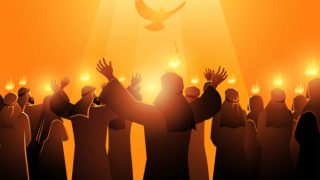
FAITH IN THE MIDST OF CHALLENGES
HOMILY FOR TWENTY-SEVENTH SUNDAY IN ORDINARY TIME, YEAR C. Readings: Habakkuk 1:2-3,2:2-4; Psalm 95; 2 Timothy 1:6-8,13-14; Luke 17:5-10
There is this popular saying that “Only the pillow knows the taste of our tears, the weight of our pains, the hidden emotions and broken hearts.” Some are able to share their pains with others, while some suffer many things they find difficult to share with people and could only pour out their emotions to their pillows. When we are faced with challenges, misfortune, disappointment, barrenness, joblessness, hardship, persecution, oppression, corruption, injustice and bad governance, we tend to lose faith in God and begin to question his existence.
In the first reading, there were some of the aforementioned challenges during the time of the prophet Habakkuk and the people were losing their lives as a result of the violence happening in the society. It was the seventh century and the reign of king Jehoiakim, who abandoned the reforms begun by his father Josiah. The people of Judah are therefore suffering under evil leadership (2 Kings 23:37). With this, the people called on the prophet Habakkuk to consult God on their behalf and he lamented saying, “How long, O Lord, am I to cry for help while you will not listen; to cry ‘Oppression’ in your ear and you will not save? Why do you set injustice before me? …Outrage and violence, this is all I see, all is contention and discord flourish” (Hab. 2:2-3).
A lament can be inspired by any form of calamity, such as defeat in battle, exile, illness or death. The purpose of the lamentation of the prophet Habakkuk was typically to persuade God to provide relief from calamities. Habakkuk might be protesting that God has neither listened to his people’s cries for help nor exercised his power to save them from their leaders. He could not understand why God permitted all these to happen to his people nor take action to save them. He expresses the kind of outrage that we would feel if we were to see a police officer standing by, doing nothing while a crime is happening in his presence, or to watch a child being beaten in the presence of the parents who are capable of saving the child but are doing nothing about it.
It is fitting to say that the Nigerian situation is a replica or replay of what happened in the time of Habakkuk. Our prophets, bishops, priests, pastors and people have lamented over the poor leadership of the nation. We have seen the sufferings of our people and have cried to God on various occasions. We have seen the joblessness, unemployment and hunger ravaging our people; we have seen the marginalization from those in power, the deprivation of our students from school, the violence and frequent killings of our people and the unjust detention of those who speak up for justice. We have also seen that our courtroom no longer honour the laws and justice cannot be upheld. We have seen the pains from families and friends, the pains of life partners, the pains of childlessness among couples. We have experienced so many relational and emotional pains from loved ones and we have cried to God and still lamenting on our present situation like the prophet Habakkuk, asking: “How long, O Lord are we to cry for help and you will not hear?”
In all these, God ordered Habakkuk to write his vision plainly on his tablets as a response saying, “For the vision is yet for the appointed time, and it hurried towards the end and will not prove false. Though it takes time, wait for it” (Hab. 2:3). It is an eschatological vision, to be realized in God’s good time. When it comes to time, we recall ‘chronos’ and ‘kairos’ (the time of God and the time of man). To humans, God’s time might seems slow, because “a day is like a thousand years in God’s eyes” (2 Peter 3:8). There is, a good deal of uncertainty regarding when the appointed time will come, but it is certain that it will come.
In the face of all this, the reading challenges us to stand firm in faith as St. Paul in the second reading urges us “To fan into flame the gift that God gave you when I lay my hands on you” (2 Tim 1:6). By this, St. Paul encourages Timothy as well as you and I, never to get discouraged. Let the challenges and pains of life never weigh us down. To keep a fire burning, there is need to stir it up; if left to itself, it will burn out, but God wants us to keep our gifts burning strong for Him. Let the fire of faith and love not quench in us. It is a gift given to us by God, of which some have neglected. These gift need to be stirred up and put into action. Some are waiting passively for God to use them; but God is waiting for them to stir up the gifts that are within them. With this gift, we are to share our sufferings with that of Christ.
Amidst the challenges that confront us, the gospel of today presents our prayer point, expressed by the Apostles who recognized faith as a gift from God saying: “Lord, increase our faith” (Lk. 17:5). In response to the Apostles Christ said, “Were your faith a size of the mustard seed you could say to this mulberry tree, ‘Be uprooted and planted in the sea,’ and it will obey you” (v.6). We usually think of faith as being exercised with dramatic and miraculous works. It may be true, but the greatest miracle of faith has to do with the restoration of relationships. A small amount of faith as mustard seed is needed to accomplish great things, when it is fan into flame, it becomes great and great faith can accomplish greater things.
Hence, when the thought to question God on how long shall we cry before he comes to our aid, let us recall that faith is a gift that helps us to understand life, and bring us happiness amidst sufferings and pains.
Happy Sunday!
Fr. Ken Dogbo, OSJ










